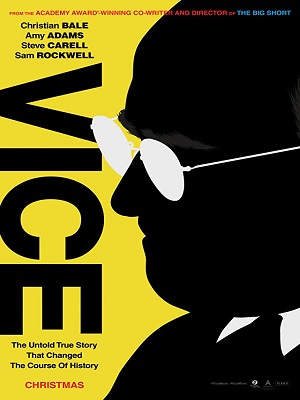Adam McKay has undergone an interesting career transition, moving from Will Farrell comedies like "Step Brothers" and "The Other Guys" to big ideas and politically-tinged damnations. He follows up his Oscar-winning "The Big Short" (which tackled the financial crash) with "Vice," a dissection of the Bush presidency from the vantage point of then-Vice President Dick Cheney.
While "The Big Short" garnered a slew of accolades (including the Best Adapted Screenplay Oscar for McKay), there was something off-putting and smug about McKay's approach. He threw financial mumbo-jumbo at the audience and broke the fourth wall to explain what it all meant, in ways that the movie thought were clever and inventive. "Vice" suffers from a lot of the same issues but feels like a more toned-down version, which slightly helps it along the way.
"Vice" follows the early years of Cheney (Christian Bale), as he started out in politics and rose up to the ranks of the vice presidency in a way that no one really had before. McKay takes us all over the Cheney timeline, from early jobs, multiple arrests, and first jobs in Washington to the eventual position in the White House. We get some glimpses into Cheney's personal life, including his marriage to wife Lynne (Amy Adams) and their relationship with their two daughters, Mary (Alison Pill) and Liz (Lily Rabe).

Bale, ever the method actor, transforms into Cheney, creating a startling accurate recreation of the controversial VP. He looks, sounds, and moves like Cheney, when compared to some stock footage, so his dedication, as always, is evident within his performance. Adams is quietly tough and domineering as Lynne Cheney, a woman who was happy to stand by her husband's side but refused to live within his shadow. Other spot-on members of the cast include Steve Carrell as Donald Rumsfeld and Tyler Perry as Colin Powell. Sam Rockwell plays George W. Bush but can't really seem to capture the essence of the former president; instead he injects a great deal of his own live-wire energy, which doesn't suit Bush's persona.
Most of "Vice" feels like a checklist played out, rarely digging into Cheney's persona but simply elevating him to the heights he reached in his political career. Of course, he was driven by power, negotiating a different type of president/vice president relationship, but what fueled that? To come close to the presidency, without ever being officially elected? McKay seems interested in exploring this on a surface-level basis, intercutting montages and graphics that, frankly, don't appear to mean anything of significance to the story. But he is keen on showing, rather than telling.
What plagues "Vice" is a screenplay that's uncertain of its own central thesis. There is a narrator throughout (who we see a few times, played by Jesse Plemmons) who spends the movie mythologizing Cheney, and at times McKay's screenplay seeks to indict him. Perhaps the movie tries to have it both ways, but as McKay struggles to find the balance he constantly seems at war with himself.
Going into "Vice" your opinions of the Bush-Chaney era will likely have been long-solidified, and McKay won't try to pull you to one side or another. That's important, and respectful of him as a filmmaker. However, the central figure of "Vice" is Cheney, and by the end of the movie it's clear McKay's objective has been to comment on the Trump Administration, something he is free to do with his platform. But if that is the goal then make that movie; don't let it hide within a different one.
| Movie title | Vice |
|---|---|
| Release year | 2018 |
| MPAA Rating | R |
| Our rating | |
| Summary | This profile of the infamous vice president can't commit to indicting or mythologizing the man, or decide if it's a drama or screwball comedy or an exploration of the past or the present day -- and these contradictions make for a movie at war with itself. |